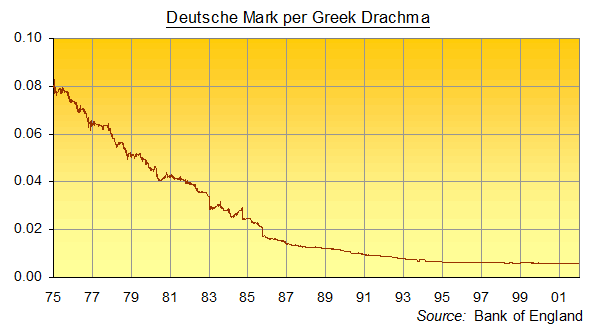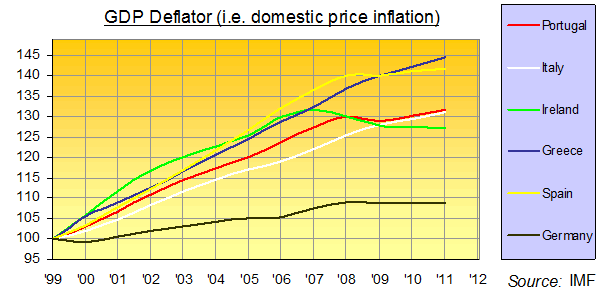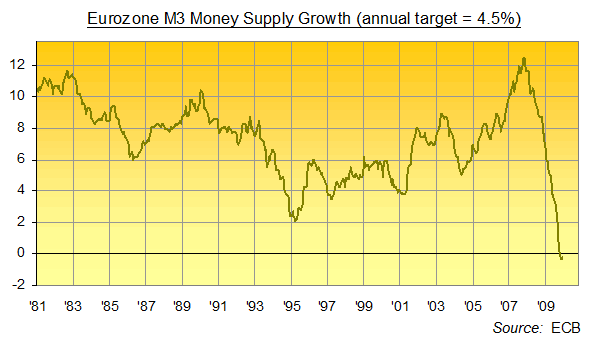Gold Euro Record High, Euro-zone Crisis as Economies Cannot Devalue Against Each Other
Currencies / Euro Feb 25, 2010 - 01:25 AM GMTBy: Adrian_Ash
 It wasn't called the "irrevocable exchange rate" for nothing...
It wasn't called the "irrevocable exchange rate" for nothing...
PRICING YOUR money in gold – in a world where everyone else does the same, and at fixed exchange rates, too – makes for a big problem if the welfare state begins gobbling up more wealth, year after year, than it earns in taxation.
"No [social] safety nets were allowed. If the gold stock was flowing outward [thanks to the currency falling on the international exchanges], interest rates had to rise to attract foreign funds and the domestic economy had to be suppressed to curtail imports."
So wrote Peter Bernstein of the Gold Standard in The Power of Gold. Glued back together after the cataclysm of World War I, this informal yet tightly rule-bound system cracked and finally shattered for good in the 1930s. But "even when countries went off gold," as Princeton professor Paul Krugman wrote in late 2009, "the prevailing mentality made them reluctant to cut [interest] rates." Or rather, it made them reluctant to cut the cost of money below zero, as he would advise. Because with the monthly in- and out-flow of gold bullion from the foreign exchanges for so long measuring the credit extended by foreign and domestic wealth, government policy naturally leant towards deflation.
Defending the value of cash, rather than inflating it away, gives creditors confidence. And that, paradoxically, is the only way to finance deficit spending long term. The alternative, at least to the mind of 1931 policy-makers, was Germany's 2.7 million per cent Weimar inflation of 10 years before.
"Whether we returned to the Gold Standard [after WWI] too early or not is debatable, but it is no longer a matter of more than academic interest," wrote Edward Peacock, King George V's own financial advisor, a director of Baring Bank, and a likely-looking successor as Bank of England governor, on 1st August.
"To go off the Gold Standard, for a nation that depends so much upon its credit, would be a major disaster."
Hence the deflationary measures – such as slashing the dole by ten if not twenty per cent – argued over in cabinet. Great Britain couldn't support both its gold reserves and its growing state-spending commitments, a fact made livid by the apparent "bankers' ramp" that bet against the Pound on one side, trying to force a cut in state wages...and the near-mutiny of a thousand Royal Navy sailors at Invergordon on the other, after those wage cuts were imposed.
The news from Scotland on August 19th sparked a fresh run on the Pound, forcing the crisis in London. Something had to give, and in a world of gold-fixed exchange rates, that something was Sterling – its gold backing, and thus its international value.
Great Britain, long "the conductor of the international orchestra" in John Maynard Keynes' phrase, abdicated its role with the ultimate default five weeks later.

"Two lessons were taught by Invergordon and the withdrawal from the gold commitment," reckoned William Rees Mogg, former editor of The Times and advisor to Margaret Thatcher, last year.
"Governments should not try to balance the budget by cutting the pay of essential public servants; and they should not defend at all costs an overvalued fixed exchange rate."
Athens today is a long way from balancing its budget. It rarely tried to defend the pre-Euro Drachma, let alone at all costs. But did it enter the fixed currency union at too high an exchange rate...over-valuing its money and thus dooming itself to a date with deflation, if not default, sooner or later?
Pricing yourself out of the market, and thus out of gold bullion, was what France (at first) avoided but Britain fell for when the pre-WWI Gold Standard was revived – only to gasp its last again a decade later – in the mid-1920s. What became known as the 1925 "Norman Conquest of $4.86" in honor of the Bank of England's eccentric, neurotic and frankly unhinged governor, Montagu Norman, priced Sterling at its 1914 valuation in terms of both gold and the Dollar. Whereas Paris, rather than nailing itself to a particular weight or exchange rate, watched the Franc lose two-thirds of its Dollar value, before cutting income tax and raising consumption levies in 1926, inviting a flood of French wealth back into its coffers.
"From a position of approximate equality with the gold reserve of the Bank of England in 1926, the Bank of France's gold holdings were double [that] by 1929," writes Peter Bernstein in his Power of Gold. "Two years later, the French gold hoard would be approaching five times the size of Britain's."
Hence Britain's failure to devalue Sterling against bullion, rather than quit gold entirely, in Sept. 1931. It couldn't risk a final flight from the Pound, sucking out what little remained of its hoard – a phantom that would haunt the US when it ran the world's Gold Exchange system post-WWII (and only exorcised by Richard Nixon also "closing the Gold Window" four decades later). Not with France, the US, Russia and even post-Weimar Germany all hoarding ever-more gold in what proved a scramble for the ultimate money as Japan annexed Korea, Spain fell to Franco, and the Wehrmacht then marched into Prague.
Devaluation today – a policy so often used to rescue the short-term political and economic fortunes of what City analysts cannot now call the PIIGS – also remains shut to the Greeks, but for another reason entirely: Revaluation within the Euro is impossible.
Joining the European single currency, and consigning sovereign notes and coins to history, meant swapping those notes and coins for a certain, agreed quantity of Euros. Once set and enacted, that exchange rate could never again be revised. Because the exchange...once you were holding Euros...could never again be replayed.
"There is no wiggle room here," as two English academics – both smirking and gasping at the Eurozone strait jacket – wrote in a 2004 tome.
"Greece has to live with this conversion rate no matter what happens to its level of productivity or inflation relative to its Euroland partners, or its level of internal unemployment.
"If it becomes politically unacceptable to live with this rate, Greece has only one realistic option, and that is abandoning the Euro."

Hence the name – "irrevocable exchange rate". With hindsight, and the domestic inflation which continued regardless, a better name would be "irreparable".
Set 12 months ahead of each member state's last sovereign trade, that fixed and historic rate offers no second-chance to price the Euro again. To inflate (i.e. devalue) its way out of this fiscal crisis, Greece only has the nuclear monetary option of quitting the Euro. And just as in 1931 London, the forecasts for what will come after – a "disaster" indeed – are dire.
Civil protests had long since rattled Great Britain; the General Strike and its flirtation with revolution came within 12 months of the 1925 return to gold. British civil servants then fretted over ten, twenty, even fifty per cent overnight hikes in the cost of living. But the loss of credibility – and even with Sterling dropping from $4.86 to $3.25 between mid-Sept. and end-Dec. 1931 – never quite destroyed London's credit. Because the entire British Empire also went off gold together, taking almost one-quarter of the world's land mass and population with them. It thus remained the centre of world finance, including the global gold bullion trade, regardless.
Quitting Euroland, on the other hand, would leave Greece – or Spain, Ireland or Portugal, or all of them together – horribly alone. Gold Standard historian and former IMF advisor Barry Eichengreen posited an Italian exit back in late-2007. Only the names have been changed:
"The very motivation for leaving would be to change the parity [between Greece's new domestic currency and the now-neighboring Euro]...Market participants would be aware of this fact. Households and firms would shift their deposits to other Euro-area banks. A system-wide bank run would follow. Investors anticipating that their claims on the [Greek] government would be redenominated into [the Euro's devalued replacement] would shift into claims on other Euro-area governments, leading to a bond-market crisis...
"It would be unlikely that the ECB would provide extensive lender-of-last-resort support. And if the government was already in a weak fiscal position, it would not be able to borrow to bail out the banks and buy back its debt."
In short, "This would be the mother of all financial crises," guesses Eichengreen. But no matter, he says; it can't happen. "The decision to join...is effectively irreversible. Exit is effectively impossible."
How come? "The insurmountable obstacle to exit is neither economic nor political, but procedural," says the professor. Short of a coup, revolution or state failure, you have to agree.
First, all contracts – both domestic and cross-border – would either be void (which again means revolution, state failure, coup or all three), or they'd be subject to a sweeping redenomination law. That would require long, detailed, co-operative discussion, both internally and with governments, business and private individuals across the European Union and beyond. So no dice there, then.
Then there's the logistical nightmare of re-pricing all goods and services, replacing all those vending machines, and reprogramming all Greece's bank and till systems – a fun project when Euro accession approached, but hardly a laugh as hyperinflation looms. So again, we're back to revolution...if not a coup or failed state...and you don't need to be Helmut Kohl or Jacques Chirac to wince at the irony of Europe's greatest unifying dream (to date) ending with chaos and bloodshed west of the Balkans.
Greece's problem, therefore, really is "a Eurozone problem" as finance minister George Papaconstantinou has repeated throughout this crisis. Since it cannot devalue or exit, something else has to give. And that something, we guess, is the Euro – or rather, its historical backing of post-war German-style strength, built on the living memory of Weimar inflation and so coveted by those very Eurozone states now making it untenable.
"The Europeans would be silly to let this blow up," says Credit Suisse's head of interest-rate strategy, speaking to Bloomberg. "The ECB will have to be relatively dovish and relent a bit on their plan to withdraw [banking] liquidity."
Relenting "a bit" is precisely what the Euro was supposed to avoid, however, and precisely what got it into this mess. Sticking to the Growth & Stability Pact's budget deficit rules may (or may not) have kept the Euro's 16 members aligned economically (a balance of payments limit would have helped, too) but it's too late now to pretend 3% and 60% hold more than totemic value. The ECB's half-trillion in ultra-cheap liquidity, meantime, went against all the European Central Bank claimed to stand for when it opened in 1998, setting the aim – long since forgotten – of keeping money-supply growth at 4.5% per year for fear of the price-inflation or deflationary collapse that might otherwise follow.

"Public commitment", "vigilant on inflation", "price stability"...these are just words. The Eurozone union is fact. And while promises, like rules and "stability pacts", can be over-looked, the world's most heavily issued money cannot.
Not by those 350 million people for whom it's now their domestic and only-possible currency – whether too strong, too weak, or devalued to all-time record lows against gold.
By Adrian Ash
BullionVault.com
Gold price chart, no delay | Free Report: 5 Myths of the Gold Market
Formerly City correspondent for The Daily Reckoning in London and a regular contributor to MoneyWeek magazine, Adrian Ash is the editor of Gold News and head of research at www.BullionVault.com , giving you direct access to investment gold, vaulted in Zurich , on $3 spreads and 0.8% dealing fees.
(c) BullionVault 2010
Please Note: This article is to inform your thinking, not lead it. Only you can decide the best place for your money, and any decision you make will put your money at risk. Information or data included here may have already been overtaken by events – and must be verified elsewhere – should you choose to act on it.
© 2005-2022 http://www.MarketOracle.co.uk - The Market Oracle is a FREE Daily Financial Markets Analysis & Forecasting online publication.



